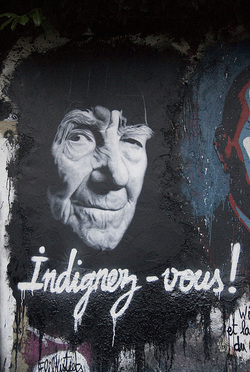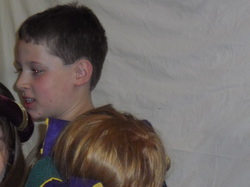
Gone was Liberté, Égalité, Fraternité.
In its place: Travail, Famille, Patrie (Work, Family, Nation).
One needn’t perform doctoral work in semantics to understand that the two slogans represented radically different expectations of citizen involvement. Liberté, Égalité, Fraternité emphasizes freedom and equal rights.
But Travail, Famille, Patrie?
It’s the cynical statement of a government that wishes to treat its subjects as if they were insects—it might work as the governing principle of an ant colony or a beehive, but not in a community that valued free thought and the rights of the individual.
If you add Dieu to the mix, it also seems like the kind of order that right wingers wish to impose on this country.
The Nation recently published a translation of Stéphane Hessel’s Indignez-Vous!, marking its first official US publication. Consider buying their March 7 issue or reading it at your local library—for now, at least, it’s available online only to subscribers. Another English translation is available here, but of the two, I much prefer the one that appears in The Nation.
In the time since I first wrote about Hessel last month, his call for indignation has become especially relevant in this country.
What’s going on in Wisconsin scares me. Plus there’s the wealth gap to consider. Yesterday, Michael Moore wrote that the nation’s richest 400 people have accumulated more wealth than half of the entire American population. Think of it—wealth has become so concentrated that 400 people have more money than 155 MILLION people.
Moore’s facts have been called into question sometimes—but even if he’s wrong by a factor of ten, the implications are enormous. Recent Supreme Court rulings have allowed wealthy activists to have more influence in elections than ever. Consider that virtually the entire Tea Party movement (i.e., a group of people who like to think of themselves as grassroots populists) was bankrolled by a handful of individuals and you’ll begin to understand the oversized splash that a well-orchestrated cadre of plutocrats can make.
A joke making its way around the internet goes:
A public union employee, a tea party activist and a CEO are sitting at a table with a plate of a dozen cookies in the middle of it. The CEO takes 11 of the cookies, turns to the tea partier and says, "Watch out for that union guy. He wants a piece of your cookie."
More than anything I’ve heard, this joke epitomizes the class resentment strategies which the super-wealthy have put in play.
I have faith that things eventually will correct themselves. I mean, I just can’t believe that cynical entreatments to self-declared “populists” will always deliver the results that the plutos desire. Is my faith in my fellow citizens misguided?
In France, where academic freedom is apparently less stable than I imagined, Sarkozy fonctionnairies have repeatedly prevented Hessel from speaking to university audiences.
In this country, I’m puzzled that Hessel’s message hasn’t been more rapidly embraced. Then again, here ideas are only embraced during election years.
The steadfastly pro-Israeli The New Republic recently published a scathing article about Hessel. Their line of attack was rather bizarre. They dislike how Hessel condemns Israel’s treatment of Palestinians. However, on other issues, they charge that he is a damaged messenger because he is silent about the horrors of Darfur, the wars in the Congo, Vladimir Putin’s oligarchical rule, and the behavior of the Chinese communist party.
[Mind you, the entire contents of Indignez-Vous! were printed in just five pages of The Nation; it was never intended as an encyclopedic catalog of current political atrocities.]
The New Republic also faults Hessel for trying to highjack the spirit of the French Resistance, which they paint as an apolitical movement.
As The New Republic writes,
“For what defined the years 1940 to1944 in France was, precisely, the absence of politics: a country under foreign occupation is deprived of the opportunity, and the responsibility, of self-government. This is a source of humiliation and suffering, but it can also, to those brave people who continue to engage in public life, be a source of exhilarating clarity.
I’m not going to equate today’s Űber-rich with yesteryear’s Nazis. As self-interested as they are, they’ve yet to encourage a kristallnacht, erect an Auschwitz, or hurl V-2s willy-nilly at civilian populations.
However, increasingly they’ve taken on the appearance of an occupying political force. They’ve perverted electoral laws, poisoned political debate, and marginalized the influence of average citizens in the political process. Chrystia Freeland writes convincingly in The Atlantic Monthly that the wealthy no longer see themselves as bound by national laws; they’ve become an international élite.
When the plutocrats are seen as an invasive occupying force, Hessel’s employment of the Resistance legacy is valid—as is his thought that non-violent indignation is the best way to reign in the wealth and power imbalances.
As WWII dragged on, French indignation registered in how citizens satirized the Vichy-imposed slogan. Instead of Travail, Famille, Patrie, most referred to it as Tracas, Famine, Patrouilles (Bother, Hunger, Surveillance). Word play and satire (like the joke quoted above about the cookies) does not directly lead to political change, but it can prepare the way.

This year, Sebastian, my 9-year-old son, has been participating in his elementary school’s Odyssey of the Mind team. For those unfamiliar with the program, Odyssey of the Mind is an international educational program designed to spur creativity and problem-solving skills.
For his particular program, he and his six teammates produced a one-act play. Adult input was strictly forbidden, so they were responsible for everything—including writing the script, creating the props, costumes, and stage set. They’ve been working on the production at least once a week since October and the results have been fantastic. Their play was genuinely funny!
The picture above was taken of Sebastian during their dress rehearsal last Friday.
On Saturday, I drove Sebastian to the OM regional competition. Moments before taking the stage, calamity happened: one of the team’s props (a glass fishbowl) broke. Sebastian had two roles in the play—not only did he have an on-stage speaking role, he also provided the “voice” of the fish. If this had happened to me, I probably would have been totally unnerved. Instead, the team hatched an improvisational plan, saving the day.
His team placed third in the OM regional competition—but they also earned a special award for the quick, creative way they overcame this adversity.
I look at Sebastian as something of a super-hero: he’s extremely intelligent, but also creative, funny, sensitive and (most shockingly!) humble. He’s such a loving brother to his two siblings. He’s been playing organized soccer for years, but also plays the cello. He goes to twice-weekly orchestra rehearsals but still plays with toy cars and marbles whenever he’s not inventing some new and super-cool game of his own.
He’s spectacular—but so are all his OM teammates.
OM has been a fantastic experience. Through it, for the first time really, he’s had to work on a long-term project with other people. He’s learned far more than just introductory theater skills—he’s learned to better communicate his thoughts, listen and negotiate, and respect others. Hopefully, these things will stick with him for the rest of his life.
People say that team sports teach children how to get along with others in group situations. However, learning how to execute over-lapping runs on a soccer field or pass the ball to an open teammate just does not compare to the skills one learns when preparing something as complex as a theater production.
Hessel argues that “TO CREATE IS TO RESIST. TO RESIST IS TO CREATE.”
Sebastian and his teammates created their own reality—both offstage and onstage. I’m now starting to think that the world would be a lot better off if we pushed more of our kids into theater camps, and fewer of them into athletics.
Addendum: The photo of the Stéphane Hessel mural at the top of this entry comes from Theirry Ehrmann’s massive installation, Demeure du Chaos (Abode of Chaos), located outside of Lyon, France. If you have some time, check out Étienne Perrone’s 999, the 2008 documentary about Ehrmann’s installation.
 RSS Feed
RSS Feed
